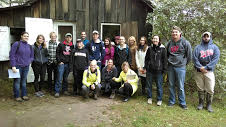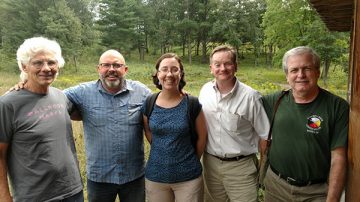“The oldest task in human history is to live on a piece of land without spoiling it” is an Aldo Leopold quote commonly shared in Laura Hartman’s classroom.
In 2015, Hartman started her new journey as an assistant professor of environmental studies at the University of Wisconsin Oshkosh. In her brief time at the University, the synergy of her engaging classroom presence and implementation of her research and experiences into the classroom have already created meaningful effects on her students.
Last summer, Hartman hopped aboard a train and went to Flagstaff, Ariz., for a month to train in a summer institute sponsored by the National Endowment for the Humanities. There, she met and collaborated with 25 other humanities professors on the subject of Leopold’s land ethic and how it applies to contemporary problems.
“His wisdom has relevance even for issues he could not have fathomed, such as climate change,” Hartman said. “Those of us alive today are going to solve climate change–and we are going to solve this using our very best thinking. Our very best thinking means drawing on people such as Leopold.”
At the summer institute, Hartman wrote a paper Climate Engineering and the Playing God Argument. The article addresses the role of humans on Earth. Leopold and theologian H. Richard Niebuhr both offer views of human responsibility that clarify the risks associated with climate engineering. Hartman concluded that any decisions about climate engineering rest with the world’s poor who are most affected by it.
The impact of her work in Arizona carried over to the classroom and her students. In her environmental studies class, Hartman took her students on a field trip to the International Crane Foundation and Leopold’s shack. Her students read some of their favorite Leopold passages from The Sand County Almanac in front of the shack Leopold’s family once inhabited and on the land that inspired his thinking.
“Aldo Leopold’s writings are insightful. Leopold offers us a regional, historical, environmental and social perspective that is worth being studied,” said Sarah Szabo, a senior environmental studies major who attended the field trip. “It really helped the class to see the land through his perspective, and for Leopold that is key–he wants to school our perceptions so we see the land as a community to which we belong.”
Education is something Leopold saw as essential to respecting the land and its organisms. As Hartman makes strides academically in the realm of environmental humanities she also makes strides in the classroom.
“Dr. Laura Hartman just gets it. She commands the attention of the classroom with a whisper. She respects, listens, encourages, is honest and engaging. For those reasons–she leads by example and her students follow,” Szabo said.
Perhaps Hartman, like Leopold, is transforming the world through education and the empowerment of students.
Learn more:


